|
On Sept. 26, at the University of San Francisco graduate seminar, Culture in the Contemporary Asia Pacific, Sung gave a lecture on historical denialism and the power of civic engagement. One of the questions during the lecture was the significance of having “comfort women” memorials in the U.S. and beyond. Referring to ESJF’s 2023 decolonization study tour in Germany, Sung talked about how activists and educators in the decolonization movement saw the deep connection between sexual violence their ancestors were forced to endure under colonization and “comfort women” history in Asia. In Berlin, many activists and educators Sung met considered the Peace Girl statue a unifying symbol of all women and girls impacted by colonialism and a source of strength for activism for decolonization.
0 Comments
On Sept. 20 (KST), the Masan, Changwon, and Jinhae Civil Assembly for Japanese Military Sexual Slaves (Machangjin) hosted, and the South Gyeongsang Province Office of Education sponsored, an international conference Looking for Countermeasures Against the Denial of the Japanese Military Sexual Slavery History. The conference examined recent attempts to deny and distort the history of Japanese military sexual slavery before and during WWII. Speakers from the U.S., ROK, Japan, Philippines, Germany, and Australia presented their current situation analyses and recommendations. Sung spoke on the collective efforts made to preserve “comfort women” history in the U.S., including the SF “comfort women” memorial installation process and educational initiatives in California.
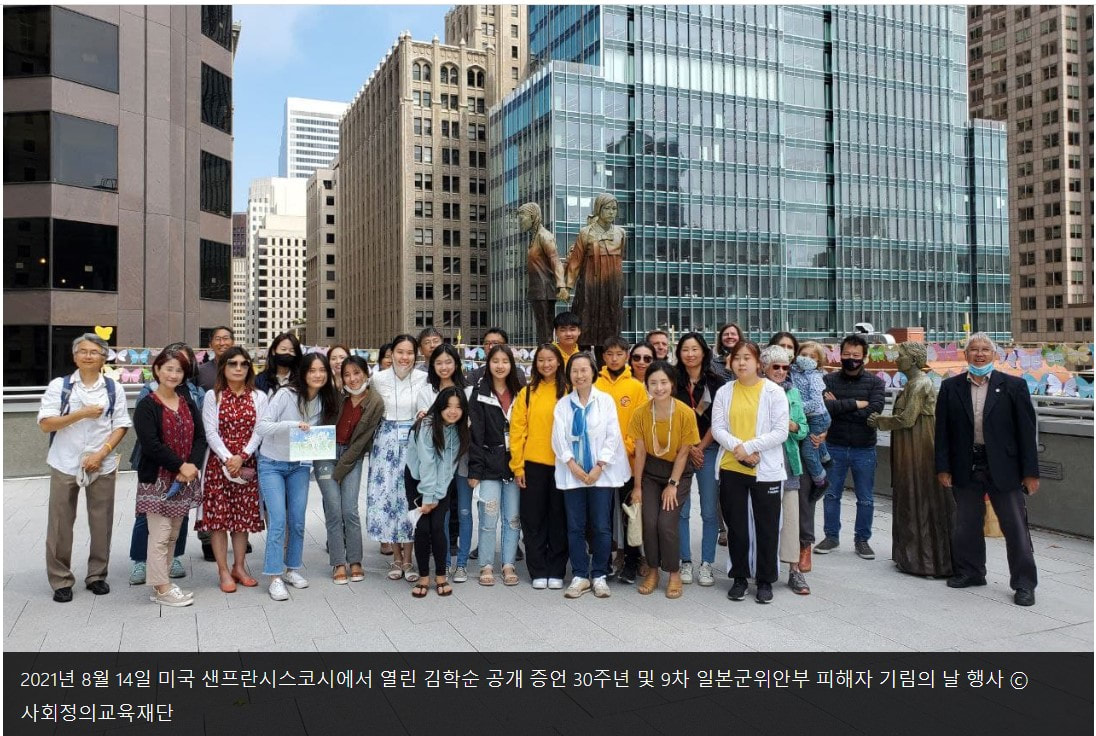 Sung Sohn’s article, “Civic Engagement in SF and Significance of Education on ‘Comfort Women’ History,” was published in the special edition of the magazine Kyeol, published by the Research Institute on Japanese Military Sexual Slavery in Seoul, Korea. This special edition honors the 11th International Memorial Day for “Comfort Women.” Sung wrote about the background of co-founding ESJF, SF civic activism to preserve “comfort women” history through a memorial and education work, and the significance of teaching this history in the U.S. and beyond. 결|일본군'위안부'문제연구소 웹진 (https://kyeol.kr/node/534) 2023년 논평 샌프란시스코 시민운동과 미국에서 일본군‘위안부’ 역사교육이 가지는 의미 글 손성숙 게시일2023.08.14
오키나와의 할머니, 배봉기 님이 돌아가시고 7년이 흐른 뒤, 그 반평생을 취재하여 기사로 엮어낸 일본인 기자가 있습니다. 매 학기 대학 강의실에서 일본군‘위안부’ 문제의 다양한 논점을 학생들과 토론하는 서울의 교수님들이 있습니다. 미국 내 아시아계 이민자들의 역사를 알리고 소수자 혐오범죄 및 성폭력 방지 교육활동을 하는 샌프란시스코의 시민단체가 있습니다. 이처럼 일본군‘위안부’ 역사의 교훈은 저마다의 공동체와 시민적 삶을 되돌아보게 만들고, 변화를 촉구합니다. 2023년 일본군‘위안부’ 피해자 기림의 날을 맞아, 그 작지만 큰 실천의 이야기를 전합니다. 1. 배봉기 씨가 오키나와에서 걸어온 전후(戦後) 2. 샌프란시스코 시민운동과 미국에서 일본군‘위안부’ 역사교육이 가지는 의미 3. 일본군‘위안부’ 역사교육 현장의 이야기를 듣다 I 4. 일본군‘위안부’ 역사교육 현장의 이야기를 듣다 II 미국 캘리포니아주 샌프란시스코시에 위치한 사회정의교육재단은 역사의 주변으로 밀려난 이들의 소외된 역사를 알리는 데 목적을 둔 비영리 교육단체다. 역사교육을 통한 인간의 존엄성과 비판적 사고력 증진 교육을 기본 가치로 여기는 우리 재단이 중요하게 다루는 주제에는 1) 성폭력 및 젠더 기반 폭력(sexual and gender-based violence) 방지 2) 미국 내 아시안 디아스포라 역사와 이슈 3) 시민들의 저항과 단합 등이 있다. 교사의 자율성이 높은 미국에서 이 주제들의 접근성을 높이고 이를 통한 역사교육을 적극 권장하기 위해 우리는 현직 역사 교사들과 함께 재단의 가치를 반영한 커리큘럼과 학습안을 만들고 있다. 이 글에서는 우리 재단의 설립 배경에 대한 소개와 함께, 재단의 교육활동과 미국에서 일본군‘위안부’ 역사를 알리는 일의 의미와 중요성에 대해 이야기하고자 한다. 사회정의교육재단 설립 배경사회정의교육재단을 애초 계획보다 앞당겨 2017년 여름에 설립하고, 재단의 첫 주제 또한 ‘미국 내 아시아 디아스포라 역사와 이슈’에서 ‘성폭력 및 젠더 기반 폭력 방지’로 바꾼 데에는 2015 한일 ‘위안부’ 합의와 이와 관련해 조선학교에 가해진 부당함에 맞서고자 한 배경이 있다. 필자는 사춘기 때 미국으로 이민을 와 인종차별을 겪으며, 후세들이 차별받지 않게 하려면 아시아계 미국인들이 힘을 키워야 한다고 생각했다. 그러기 위해서 미국 내 아시안 디아스포라 역사를 제대로 배우는 것이 중요하다고 생각했다. 이러한 생각은 샌프란시스코 공립통합학교구(San Francisco Unified School District)에서 한글 이중언어 교사로 재직하면서 더 공고해져, 재직 중이던 1994년 샌프란시스코 공립통합학교구에 최초로 한글 이중언어 프로그램인 한‧영 이멀젼(Two-Way Immersion)[1] 프로그램을 도입시켰다. 그 후 미국 내 초중학교는 물론 고등학교에서도 교사들이 미국 내 아시안 디아스포라 역사를 가르치는 데 도움이 되는 일을 하고 싶었다. 미국 내 아시안 디아스포라 역사는 아시아계 미국인들에게는 본인들의 역사와 뿌리에 대해 배울 기회를 제공하고, 비아시아계 미국인들에게는 미국 내 아시아인들에 대한 선입견을 지우고 이해와 존중의 폭을 넓힌다. 이를 통해 모두가 각자의 존엄성을 지키며 동등한 커뮤니티의 일원으로 성장할 수 있는 기회를 마련할 수 있을 것이라고 믿었기에, 이 분야의 발판을 다지는 데 적극적으로 힘을 보태고 싶었다. 2015년 샌프란시스코시에서 일본군‘위안부’ 피해자에 대한 두 개의 결의안이 통과됐다. 9월에는 일본군‘위안부’ 피해자 기림비 건립 결의안 342-15호가 시의회에서 통과됐고, 한 달 뒤 10월 샌프란시스코교육위원회에서는 일본군‘위안부’ 피해 역사를 10학년(고등학교 1학년) 커리큘럼에 포함시키는 결의안 158-25A1호가 통과됐다. 이 결의안은 일본군‘위안부’가 제2차 세계대전 때 일어난 인신매매 범죄임을 가르치고, 오늘날에도 지속되는 성매매와 성착취 방지 교육을 위해 발의됐다. 교사에게 결의안 158-25A1호는 필수가 아닌 선택사항이지만, 시 결의안은 일본군‘위안부’ 역사를 인신매매를 반대‧방지하고, 약자의 인권과 존엄성을 기억하는 일의 필요성과 연결하여 부각시켰다는 점에서 상당히 중요한 의의를 갖는다고 하겠다. 이로부터 두 달 뒤, 피해생존자의 의사와는 상반된 한일 ‘위안부’ 합의가 이루어졌다. 대부분 빈곤한 가정에서 태어나 힘이 없어 피해를 당한 자들의 존엄성과 인권을 또 한 번 무시한 처사였다. ‘최종적이고 불가역적 해결’이라는 합의 문구 때문에 10월에 통과된 샌프란시스코 결의안 158-25A1호가 자칫 무효화될 수도 있다는 생각이 들었다. 필자는 1994년에 한‧영 Two-Way 이멀젼 프로그램을 성공적으로 실시한 경험을 되살려 2016년 1월 첫째 주부터 주변 학부모들과 함께 편지 캠페인을 시작했다. 이 캠페인에 대한 적극적인 반응에 힘입어 캠페인 시작 2주 후에 샌프란시스코 통합학교구 인문학 커리큘럼 및 수업 부서(Curriculum and Instruction’s Humanities Department) 담당자를 만났고, 담당자로부터 일본군‘위안부’ 피해자에 대한 자료수집을 요청받았다. 이에 2016년 말 상당한 양의 자료를 인문학 커리큘럼 및 수업 부서에 제공했으나, 이곳에서는 2018년 1월까지도 여러 이유로 인해 일본군‘위안부’ 피해자에 대한 커리큘럼이나 학습안을 준비하지 않았다. 샌프란시스코 공립고등학교에서는 주로 3월이나 4월에 제2차 세계대전에 대해 가르치는 것을 알게 된 필자는 하루빨리 일본군‘위안부’ 피해자의 역사와 그 의미에 대한 교육이 시작될 수 있도록 『‘위안부’ 역사와 이슈: 교사자료집』(“Comfort Women” History and Issues: Teacher Resource Guide)을 그해 3월 말에 서둘러 발간했고, 인문학 커리큘럼 및 수업 부서는 이 책을 18개 고등학교에 배부했다. 2020년에는 교사자료집 3판과 학생자료집 『‘위안부’ 역사와 이슈: 학생자료집』(“Comfort Women” History and Issues: Student Resource Guide) 2판을 내기도 했다. 『‘위안부’ 역사와 이슈 교사자료집』(“Comfort Women” History and Issues Teacher Resource Guide) ⓒ사회정의교육재단 2017년 4월 한겨레신문에서 두 명의 조선학교 고등학생과 지바조선초중급학교가 부당한 일을 당했다는 기사를 읽었다. 2016년 12월 지바조선초중급학교에서 열린 제45차 학생미술전시회에는 일본군‘위안부’ 문제를 주제로 한 학생 작품 두 점이 전시됐는데, 그 두 작품은 ‘2015 위안부 합의’를 반대하는 마음을 담은 조연수 학생의 작품과 ‘위안부’ 할머니들의 고통에 공감하는 마음을 표현한 강애향 학생의 작품이었다. 원래 지바현 지바시는 매년 시 보조금 50만엔(약 한화 500만원)을 이 학교에 지원해왔으나 구마가이 토시히토 지바시장은 이 작품들을 문제 삼아 이듬해인 2017년부터 보조금을 삭감했다. 이 소식을 듣고 필자와 두 명의 활동가는 인권과 정의를 존중하는 두 명의 여고생들과 지바조선초중급학교를 지지하기 위해 5000달러를 모으기로 결정했고 이 과정에서 우리 재단이 설립되었다. 우리 재단은 2017년 봄부터 모금을 시작했고 8월에는 5000달러를 이 학교에 전달했다. 이로부터 재단과 학교의 인연이 시작되어 매년 후원을 지속해, 2021년부터는 우리 재단이 지바조선초중급학교 학생들을 대상으로 미술대회를 개최했다. 지바조선초중급학교 외에 우리 재단이 정기 지원하는 또 다른 단체는 ‘Days for Girls International’이다. 이 단체는 전 세계 빈곤 지역에서 생리대가 없어 학교를 못 나오는 소녀들에게 3년 동안 지속적으로 사용 가능한 생리대 키트와 보건교육을 제공하고 있다. 2017년에 설립한 사회정의교육재단의 구성원에는 필자를 비롯한 공동설립자, 현직 교사들, 샌프란시스코시에 일본군’위안부’ 기림비를 세우자는 결의안 324-15호를 상정하고 통과시키는 데 주도적 역할을 한 에릭 마 전 샌프란시스코 시의원, 인턴, 이번 가을이면 대학생이 되는 자원봉사자 그리고 학부모들이 있다. 학부모 중에는 한인 커뮤니티와의 연대를 두텁게 하고 우리 재단 관련 홍보 디자인에 힘 써주시는 분도 있다. 이분들 외에도 저렴한 가격으로 책을 만들어 주시는 인쇄소 사장님과 무료와 다름없는 수고비로 재능을 기부해주고 계신 그래픽디자이너 등 우리 재단의 부족한 부분을 채워주시는 고마운 분들이 있다. 재단의 교육활동재단의 교육활동 재단이 2017년에 설립된 배경과도 밀접한 연관이 있는 일본군’위안부’ 피해 역사는 우리가 오늘날 세계 곳곳에서 일어나고 있는 여러 형태의 성폭력 및 젠더 기반 폭력의 심각성을 비롯해 모든 이의 인권과 존엄성을 지키는 일의 중요성을 효과적으로 알리고자 할 때 대표적으로 접목시키는 역사이다. 이를 위해 우리 재단은 교사 워크숍, 강의, 다양한 커뮤니티 행사 등을 갖는데, 세부 내용에는 일본군‘위안부’ 역사가 현재 사회에서 교차되어 나타나는 부분을 적극 포함시킨다. 두 가지 예를 들어보면 첫째, 샌프란시스코 지역에서 일본군‘위안부’ 역사를 알리기 위해 범아시아계 시민들이 단합해 ‘강인한 여성의 기둥’ 기림비를 건립하고 일본군‘위안부’ 역사 교육활동을 펼친 지역사(local history)를 가르치고, 둘째, 일본군‘위안부’ 역사를 통해 얻은 교훈을 토대로 여성혐오 범죄 및 성폭력을 방지하는 교육을 실시한다. 필자가 2018년 봄에 발간한 『‘위안부’ 역사와 이슈: 교사지침서』에는 위의 내용이 강조되어 있다. 이 교사지침서는 발간된 다음 달인 4월 샌프란시코 공립고등학교에 배부되었고, 같은 해 가을에 발간된 『‘위안부’ 역사와 이슈: 학생지침서』는 2021년 캘리포니아에 있는 세인트 메리 컬리지(St. Mary’s College)에서 ‘전쟁과 여성-환태평양 분쟁들의 기억’(Women in Wartime: Memorializing Conflicts in the Pacific Rim)이라는 가을 학기 수업 필수 교재에 포함되었다. 우리 재단은 이 수업의 커뮤니티 파트너였는데, 필자는 연구 책임자로 학생들과 일본군‘위안부’ 피해자의 삶과 역사적 배경 그리고 미국에 현존하는 성‧젠더 폭력에 대해 논의했다. 그해 10월에는 이 두 책이 일리노이주 에반스톤시에서 열린 〈‘위안부’ 프로젝트 전시〉(“Comfort Women” Project Exhibition)에서 전시되었다. 유엔 경제사회이사회(ECOSOC)에서 특별 협의지위(special consultative status)를 공식 승인받은 우리는 여러 국내외 단체와 연대하고 있는데, 이 자리를 빌려 우리 재단과 연대하는 모든 단체에 감사의 마음을 표한다. 연대 단체 중 작년과 올해 우리 재단과 활발한 교육 활동을 한 NGO 단체는 한국의 일본군위안부할머니와함께하는마창진시민모임, 독일의 코리아협의회(Korea Verband e.V.) 그리고 미국의 유엔 미국여성간부위원회(US Women’s Caucus at the UN)이다. 작년 6월 경상남도교육청이 후원하고 마창진시민모임이 주최 및 주관한 교사포럼 〈일본군’위안부’역사교육 활성화를 위한 국제포럼〉에 필자와 샌프란시스코 지역에서 근무하는 두 명의 고등학교 교사, 그리고 에릭 마 전 샌프란시스코 시의원이 초대되어 경상남도 현직 중·고등학교 교사들과 의미 있는 논의를 하며 교류를 넓혔다. 올해 7월엔 두 명의 샌프란시스코 공립학교 고등학교 역사 교사와 함께 베를린으로 가서 일주일간의 독일 탈식민주의(decolonization) 학술 답사를 통해 독일의 식민 지배를 받은 국가와 시민들 그리고 이들을 지지하는 활동가와 교육자들의 연대의 힘을 목격했다. 독일 탈식민주의 운동 틀 안에서 식민지 성폭력 역사를 조명할 때, 필자가 만난 독일의 여러 탈식민주의 활동가와 교육자들은 그들의 식민지 성폭력 역사와 일본군‘위안부’ 역사를 접목시켜 본인들의 식민 성폭력 역사는 물론 모든 식민주의의 공통적 문제로 접근해서 바라보는 경향이 두드러지게 나타났다. 이들은 또한 일본군‘위안부’ 역사와 운동을 통해 독일의 식민 지배하에서 성폭력을 당한 아프리카 피해 여성들의 역사를 알리는 데 큰 힘을 얻는다는 것도 잘 알 수 있었다. 탈식민주의 운동에서 여성의 신체 주권(body sovereignty)은 식민지배나 전쟁과 같은 무력으로 인해 국가의 주권을 빼앗겼을 때 “당연히 빼앗길 수밖에 없는” 것이 아니라 그 어떤 경우에도 지켜져야 하는 인류 보편적 가치임을 더욱 강조해야 한다고 생각한다. 따라서 학술 답사 마지막 행사인 필자의 강의 ‘제국 일본의 성노예제 역사 보존을 위한 샌프란시스코 시민운동’(Collective Activism in SF Preserves the History of the Sexual Slavery System by Imperial Japan)에서 제2차 세계대전 때 연합군이나 러시아군에 의해 무수히 강간당한 유럽 여성들, 특히 독일 여성들의 신체 주권과 일본군‘위안부’ 피해 여성들 그리고 미국 내 소수 여성들의 침해된 주권에 대해 짧게나마 논의했다. 올해 7월 학술 답사를 위해 여러 독일 탈식민주의 운동 시민단체를 섭외해준 코리아협의회에 깊은 감사를 표한다. 우리 재단이 최근 활발한 연대 활동을 하는 마지막 단체인 유엔 미국여성간부위원회(US Women’s Caucus at the UN)는 여성과 소녀의 인권과 성형평(gender equity) 증진을 목표로 하며 유엔 여성지위위원회(Commission on the Status of Women)를 지지하는 미국의 페미니스트와 NGO 연합단체다. 필자는 이 단체에서 페미니스트 외교정책 국장(feminist foreign policy director)으로 활동하고 있다. 샌프란시스코 시민운동과 미국에서 일본군’위안부’ 역사와 이슈가 가지는 중요한 의미미국에서 일본군‘위안부’ 역사와 이슈가 가지는 여러 중요한 의미 중 세 가지를 강조하고자 한다. 첫째는 오늘날 성·젠더 기반 폭력[2]이 다양한 형태로 지속되고 있다는 사실이다. 2021년 세계보건기구(WHO)의 조사 결과에 따르면, 만 15세에서 49세 여성 약 3명 중 1명이 성폭력을 당한 경험이 있다고 한다. 둘째는 성·젠더 폭력이 지속적으로 발생하는 근본적인 이유는 제국주의 및 식민주의, 주권, 인권 유린, 폭력, 차별, 역사 왜곡 및 부정 등인데, 이러한 요인들은 과거에 해결되지 않은 채 현 사회로 이어져 뿌리내렸다. 이러한 근본적인 문제가 전 세계에서 가장 막강한 군사력과 경제력을 가진 미국 내에서 어떻게 표출되고 진화하는지 짚어보고 더 나아가 교육과 시민참여를 통해 이 문제들을 해결하는 방법을 강구한다면 미국 안팎에서 벌어지고 있는 성·젠더 기반 폭력 관련 문제 해결에 도움이 될 것이다. 마지막으로 일본군’위안부’ 역사의 중요한 의미는 우리의 인권이나 존엄성이 훼손되었을 때, 우리 모두에게는 그것들을 지키기 위해 목소리를 높일 권리가 있고, 다른 누군가가 이러한 피해를 당했을 때 그들을 지지하고 적극적으로 도울 책임이 있음을 일깨워주는 데에서 찾을 수 있다. 이는 비인간화(dehumanization)에 맞서 스스로 인간으로서의 존엄을 되찾고 정의와 평화를 지키는 인권운동가로 거듭난 여러 나라의 일본군‘위안부’ 피해 여성들이 실천한 삶이기에 그 의미가 남다르다고 할 수 있다. 2023년 독일탈식민주의 재단학술답사팀(왼쪽부터 Erin Hanlon, 손성숙, Christina Tang) ⓒJulia-Carla Schmidt
일본군‘위안부’ 피해생존자들이 다진 초국가적 연대와 여성인권 운동의 역사는 뿌리 깊은 차별과 사회적 편견을 경험한 미국 내 이민자 커뮤니티의 역사와 결을 같이 하는 부분이 많다. 그래서 미국 이민자 커뮤니티의 역사와 이슈가 샌프란시스코에서 범아시아계 시민들의 단결된 힘으로 증폭되어 여성인권과 존엄성, 정의 그리고 평화와 같은 전 세계적이고 보편적 가치를 잘 나타내는 일본군‘위안부’ 기림비와 피해자들의 역사를 지키는 지역사의 현장으로 자리 잡는 데 크게 기여했다고 생각한다. 전쟁 없는 평화로운 세상, 인권과 존엄성이 상식이 되는 공동체 만들기를 중요하게 여기는, 그래서 정의로운 사회에 더 가까이 다가갈 수 있는 교육을 펼치는 데 목적을 두고 있는 우리 재단에게, 초국가적 여성인권 운동으로 자리매김한 일본군‘위안부’ 피해생존자들의 인권운동은 큰 힘이자 계승해야 할 소중한 가치이다. 각주
글쓴이손성숙 15살에 부모를 따라 미국에 이민 간 1.5세대이다. 캘리포니아대 버클리(UC Berkeley)에서 언어학을 전공한 후 샌프란시스코 주립대에서 교육학 석사과정을 수료했으며 초중등 교사 자격증을 땄다. 샌프란시스코 통합학교구(SFUSD)에서 한글 이중언어 교사로 재직하던 중인 1994년에 최초로 한글 이중언어(Korean/English Two-Way Immersion) 프로그램을 실시했다. 2017년 ‘소수의 역사’, ‘잊혀진 역사’를 다시 써나가기 위해 비영리 교육단체인 사회정의교육재단(Education for Social Justice Foundation, ESJF)을 출범시켰다. 사회정의교육재단은 미국 학교 역사 교육과정에서 등한시되고 있는 소수의 역사를 교육을 통해 학생, 교사, 교수 등에게 알리고자 하는 이들이 자발적으로 모여 탄생했다. The Statue of Peace in Annandale remembering and honoring the Korean “comfort women” has been removed.
https://us20.campaign-archive.com/?e=[UNIQID]&u=a95b347fa485bbf2183d2e4dd&id=12f025e14f
Marking the 70th anniversary of the Korean War armistice, a coalition of organizations and peace advocates gathered in Washington, D.C., from July 26–28 to call on the U.S. government to formally end the Korean War with a peace agreement. Actions during these three days included a large grassroots rally in front of the White House, marching from the White House to the Lincoln Memorial, and a conference. Hundreds of people gathered. Bruce Cumings, an American historian, professor, lecturer, and author focused on East Asia, concluded his keynote speech saying that we (Americans) remain steeped in denial about a conflict that is almost 80 years old, yet always “within an inch” of breaking out again.
In recent years, the tension on the peninsula has increased sharply, and the possibility of war is higher than ever. A peace agreement would unlock the Korean Peninsula from a perpetual state of war and help thousands of Korean people visit their separated families. For decades, the U.S. has imposed sanctions and threats against North Korea, including joint military drills near the border with North Korea. In return, North Korea has developed a stronger nuclear weapons program. The old tactics have proven ineffective. U.S. House Resolution 1369, Peace on the Korean Peninsula Act, calls for a formal end to the Korean War (1950–53). Click here to urge your Congress member to support peace in Korea by cosponsoring House Resolution 1369. As seen in the case of the war in Ukraine, it is easy to begin a war but extremely difficult to end it. Also, an advancement of weapons has placed the human costs of war heavily on civilians. Considering Korea’s geopolitical situation, a war on the Korean Peninsula could be a global catastrophe. Big appreciation goes to the Korea Peace Action organizing team for the successful Korea Peace Action Week! ESJF’s own Sung Sohn participated in this mobilization. https://mailchi.mp/99570d5c40a8/june-2023-newsletter?e=[UNIQID]
ESJF’s decolonization study tour to Germany from June 19 to 23 was packed with important learning and experiences reflecting multiple perspectives on Germany’s colonization of countries in Africa from the late 19th to the early 20th century. Although they differ in approaches, the growing decolonization movement in Germany to address Germany’s past wrongs was eye-opening. In addition to visiting museums, historical sites, and neighborhoods, we met inspiring decolonization activist groups, educators, and other professionals.
Many activists and educators we met on this study tour closely connected the sexual violence their ancestors were forced to endure under German colonization with the Japanese military sexual slavery system, also known as the “comfort women” system, that numerous women and girls in Asia were forced to endure. ESJF thanks Korea Verband for making the necessary arrangements for this invaluable trip! Image credit: Julia-Carla Schmidt, Korea Verband, & ESJF https://mailchi.mp/b27805409598/may-2023-newsletter?e=9909c84291
|
CategoriesCategories |
Proudly powered by Weebly

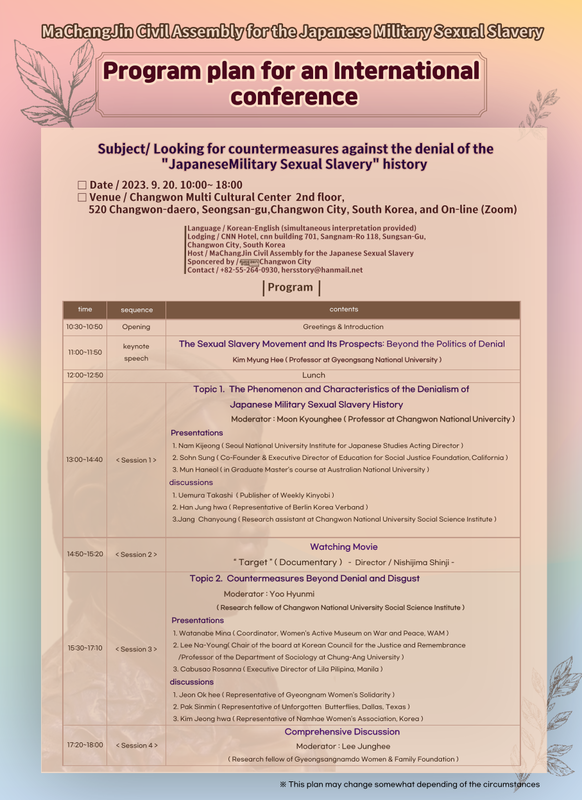
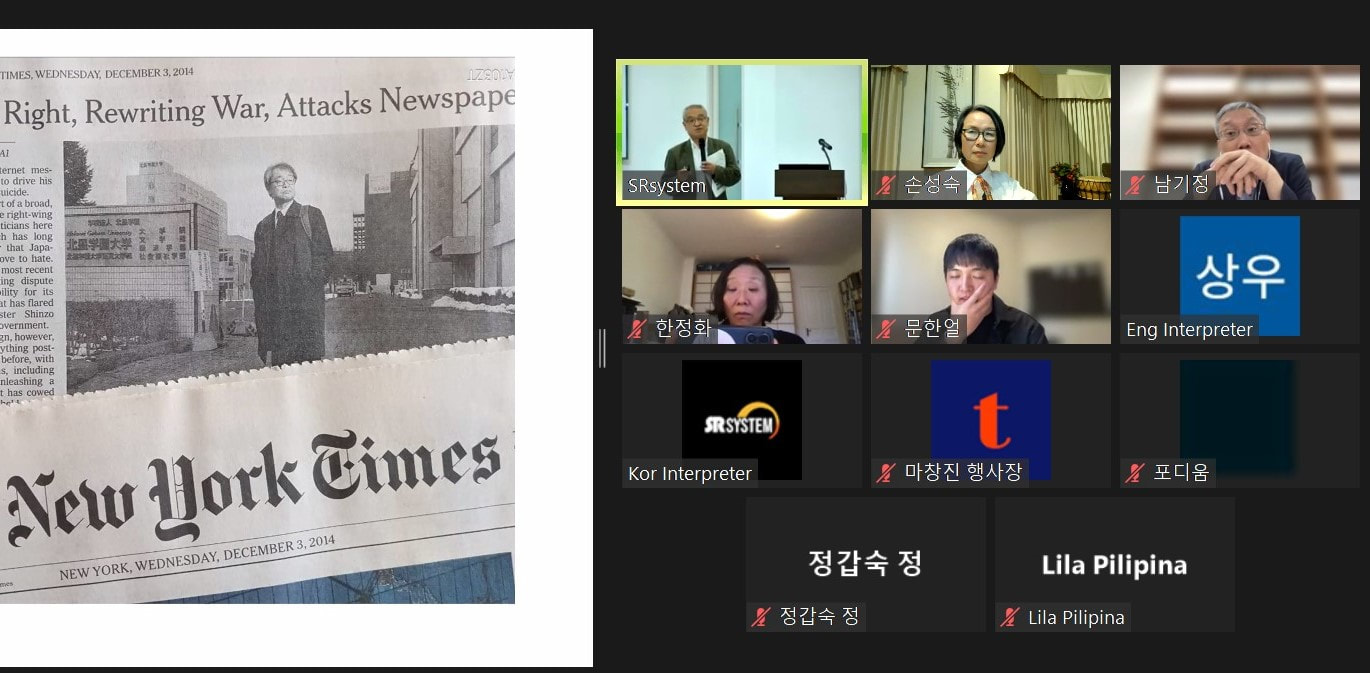
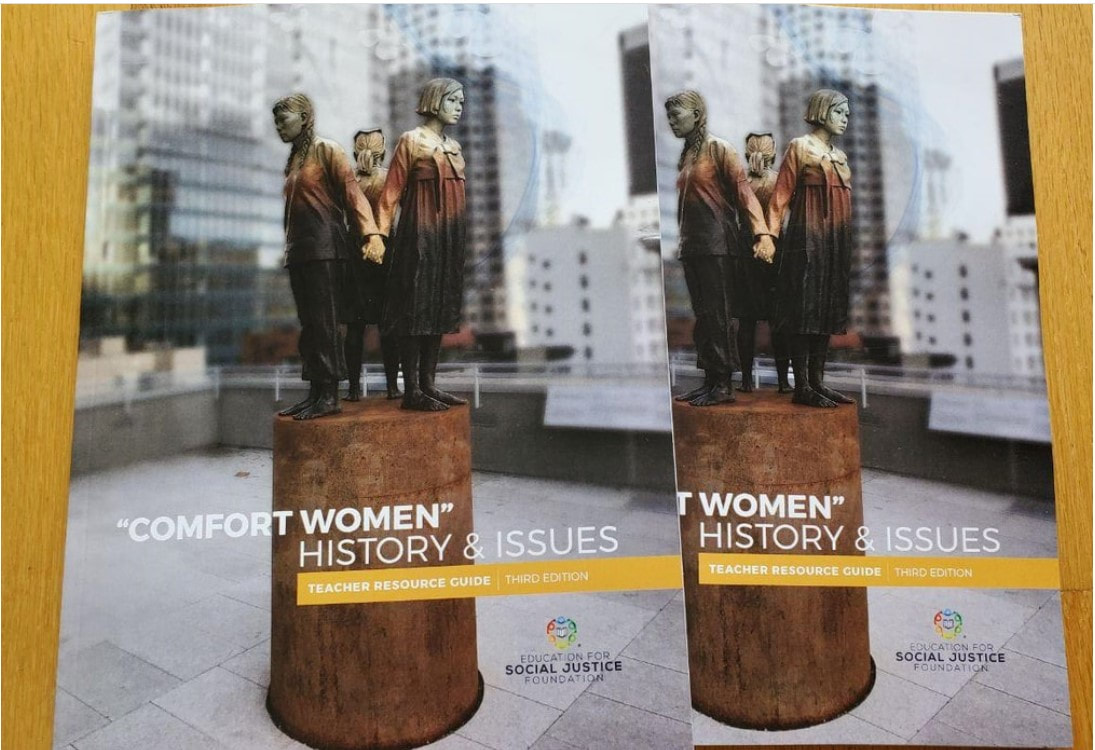
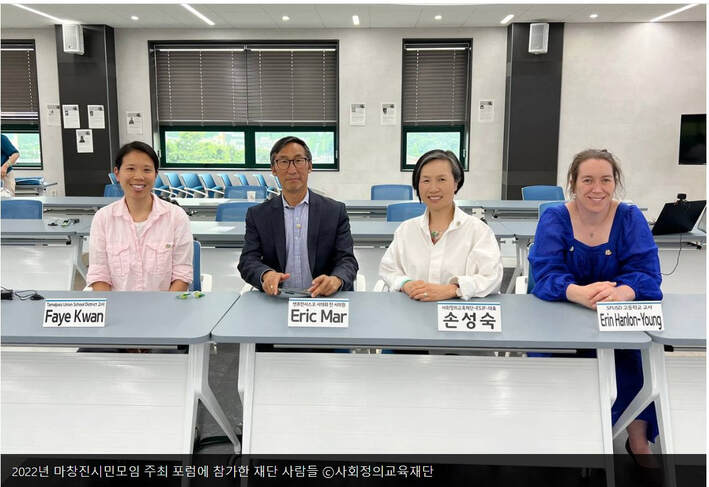
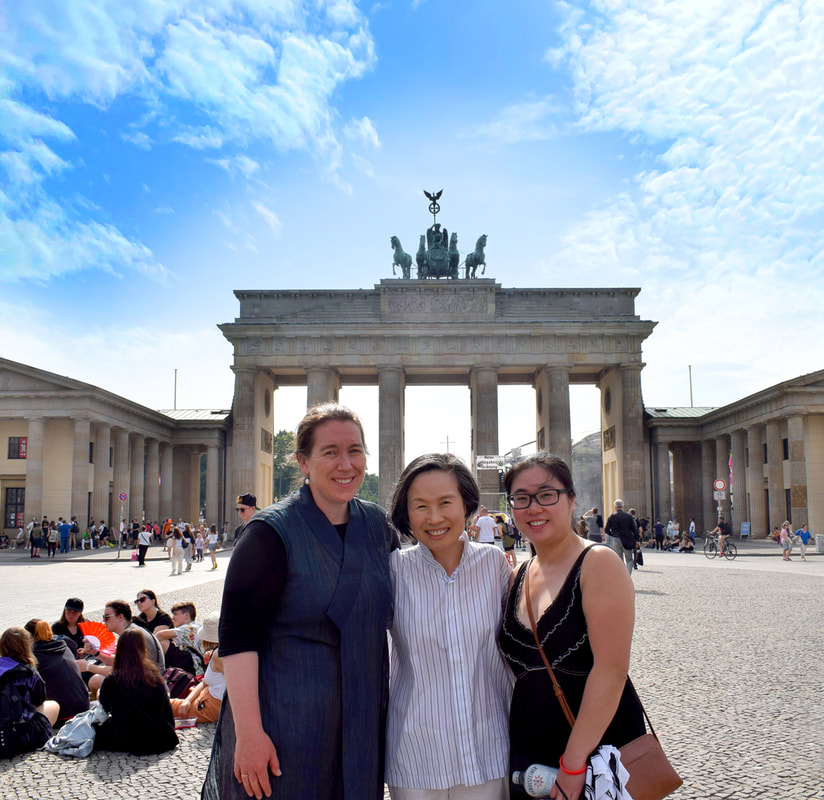
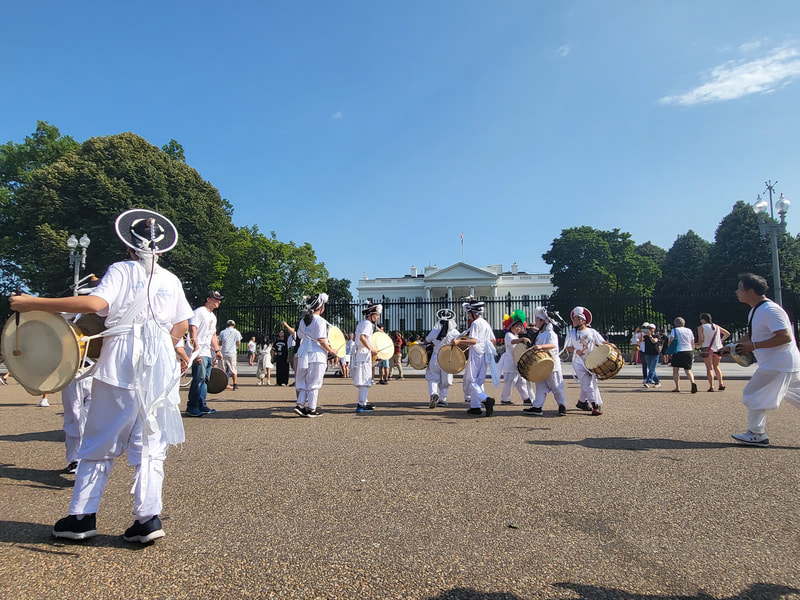
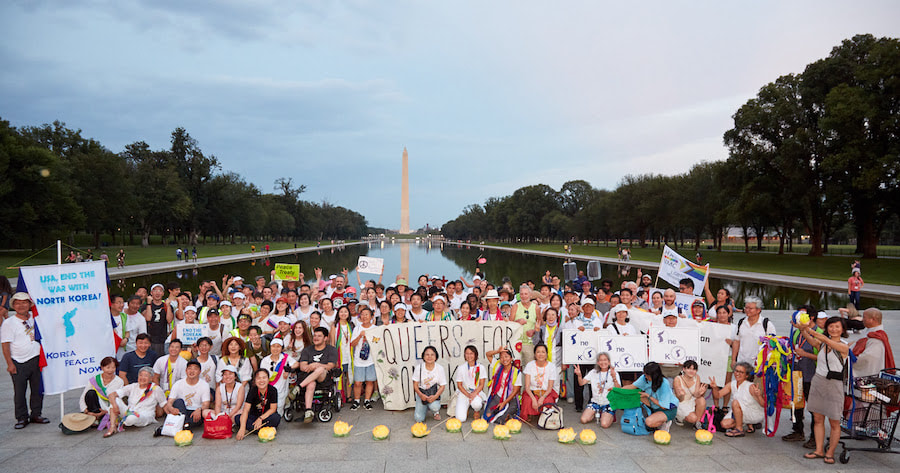
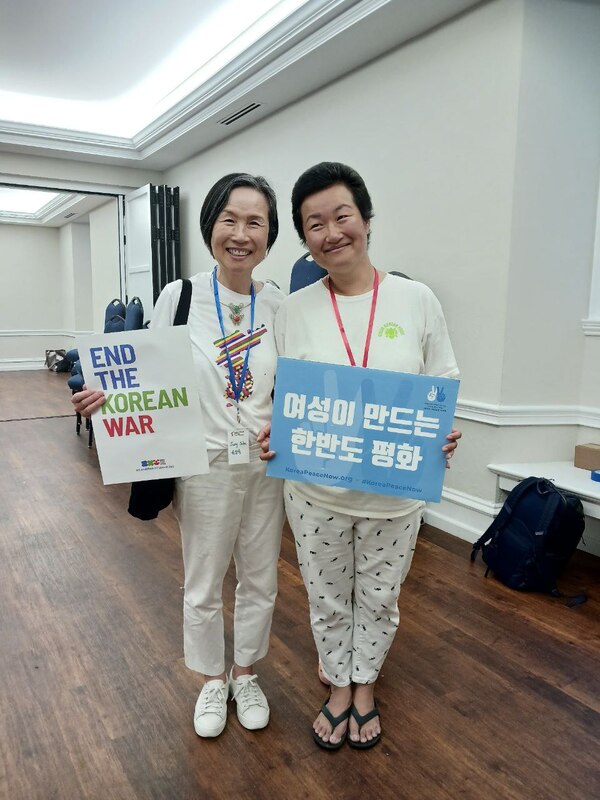
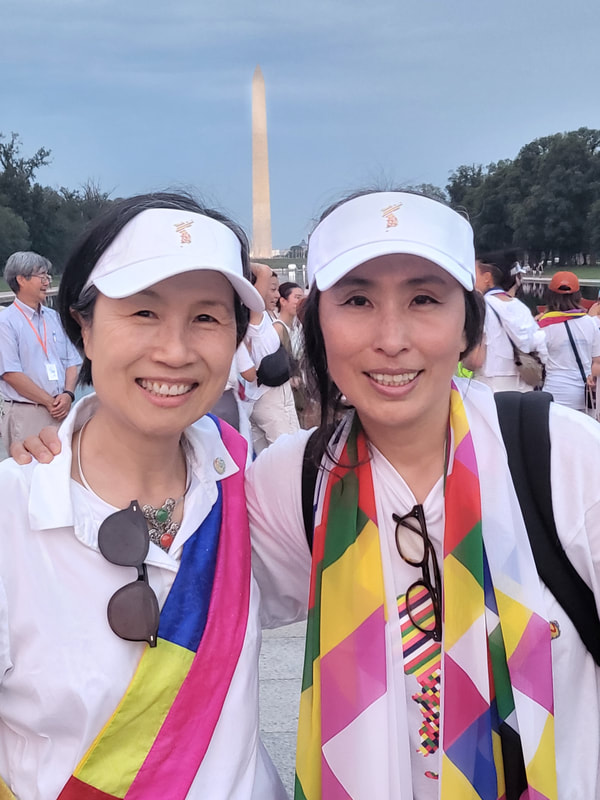
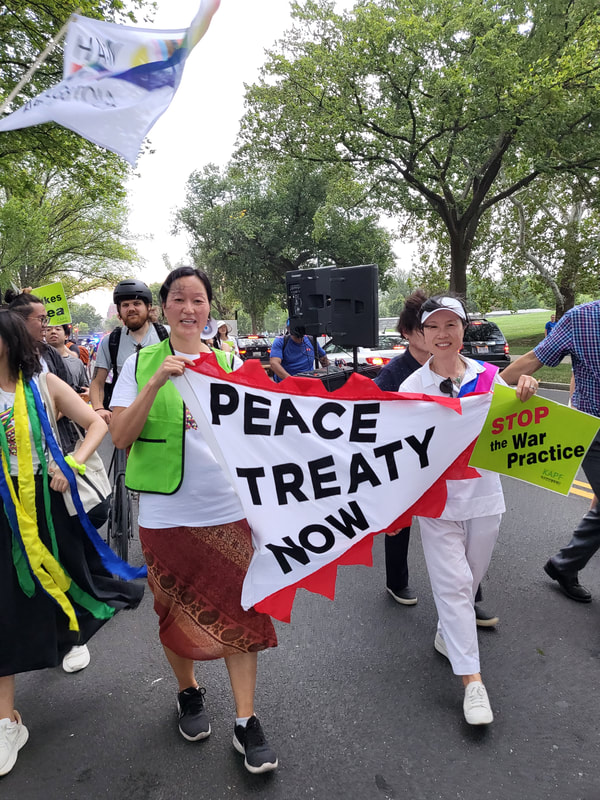
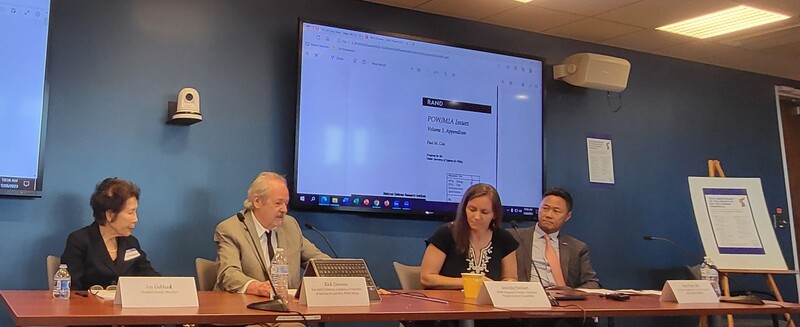
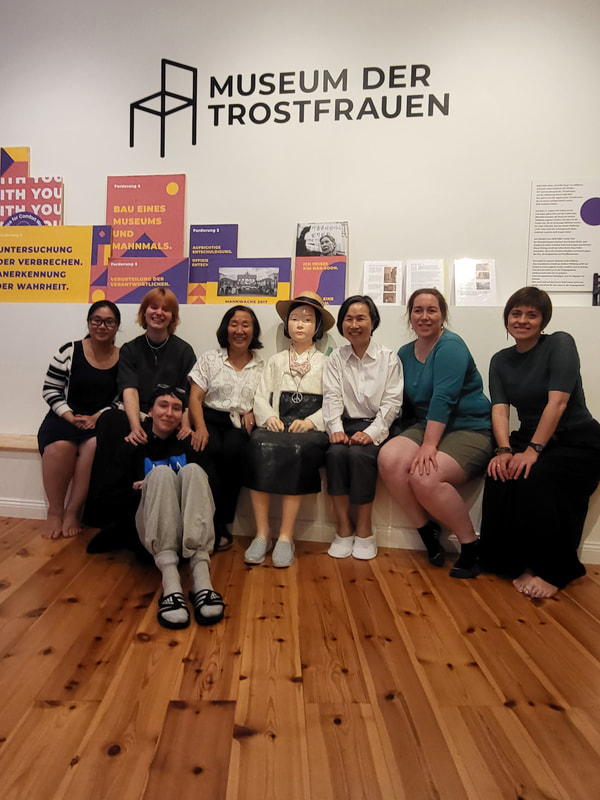
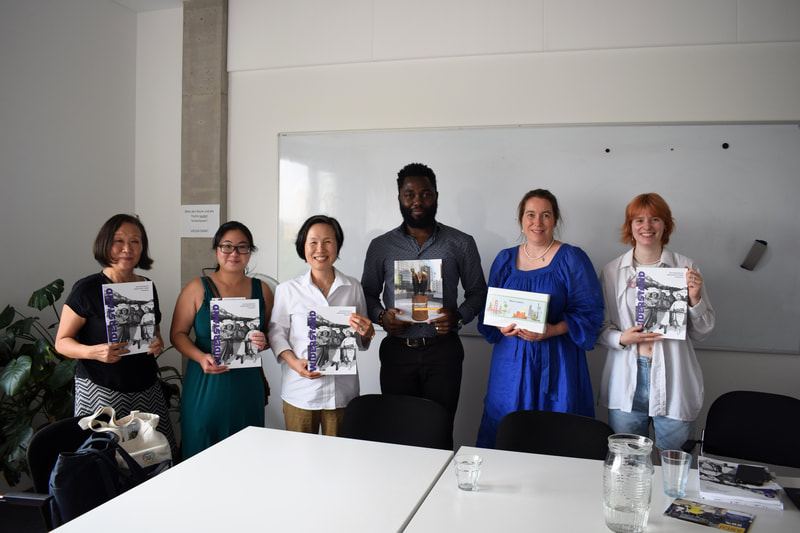
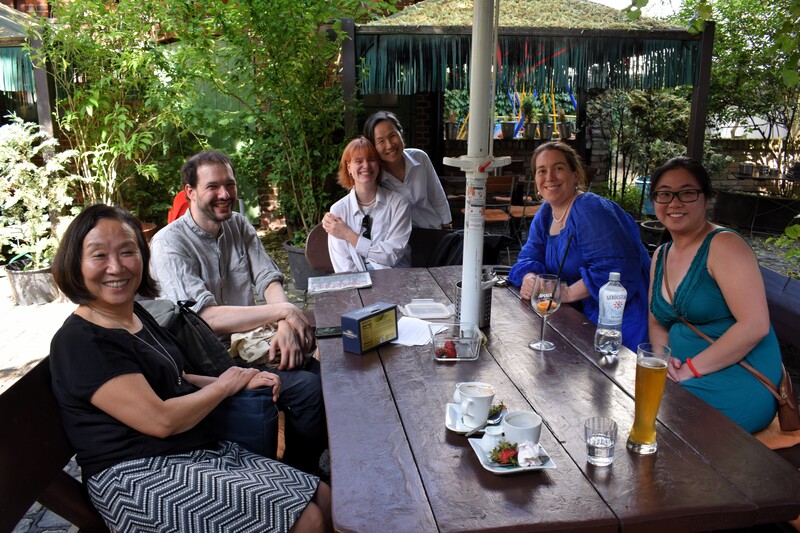
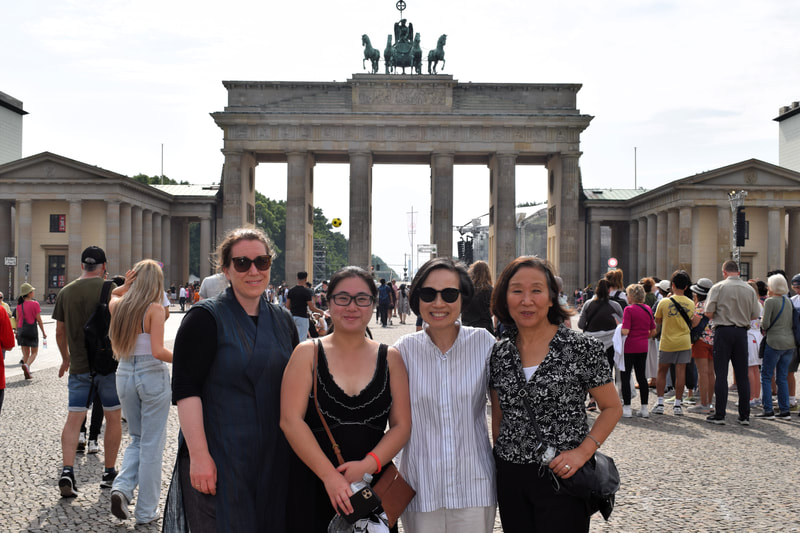
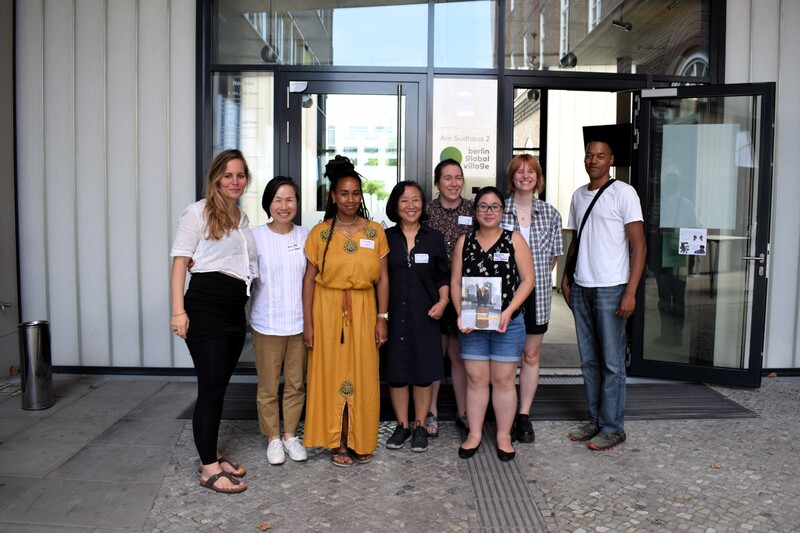
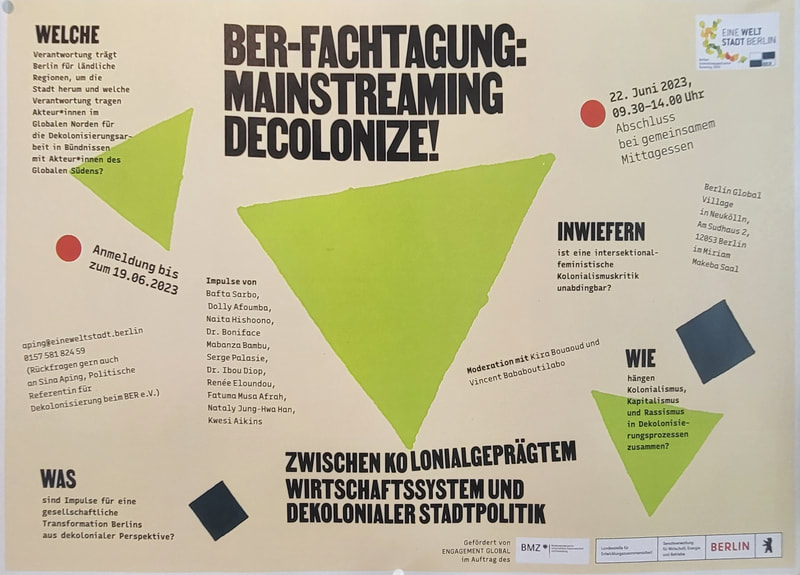
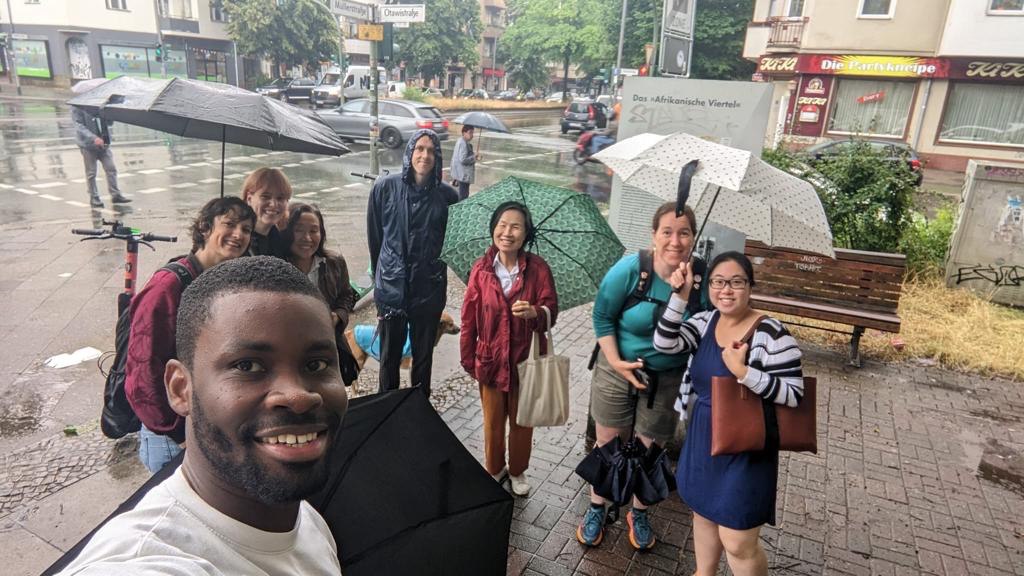
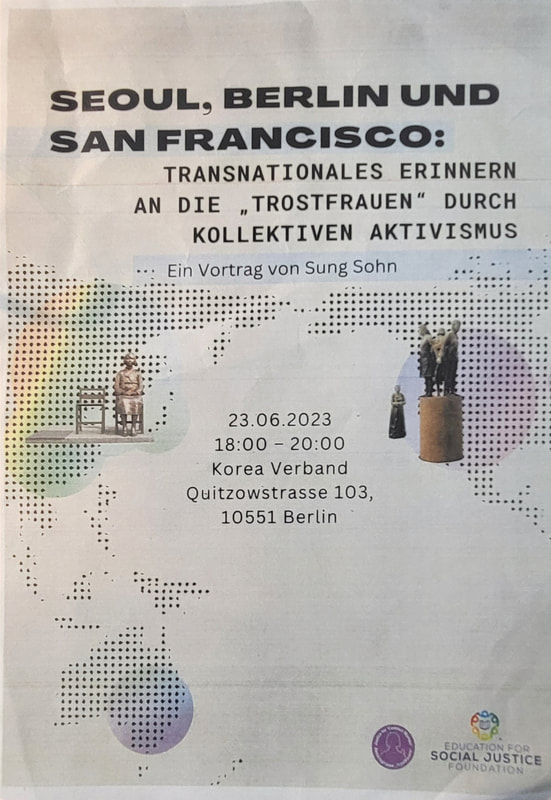
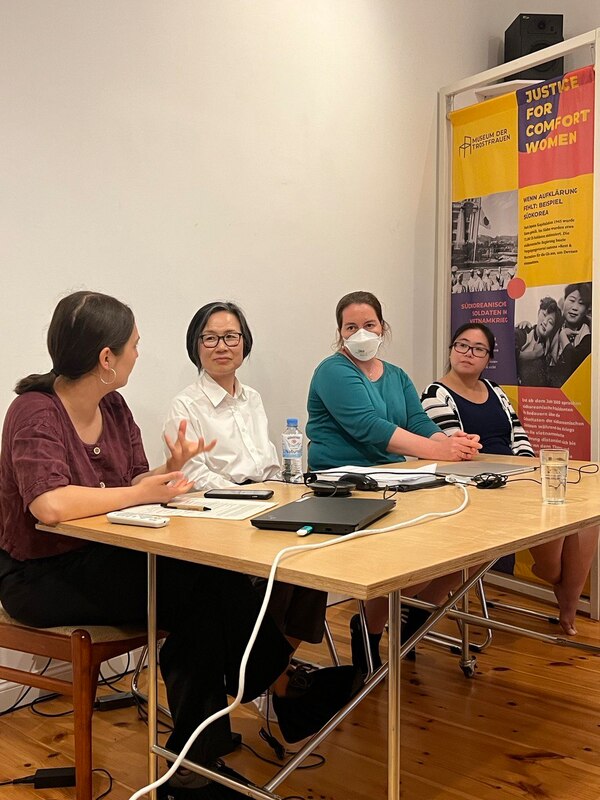
 RSS Feed
RSS Feed